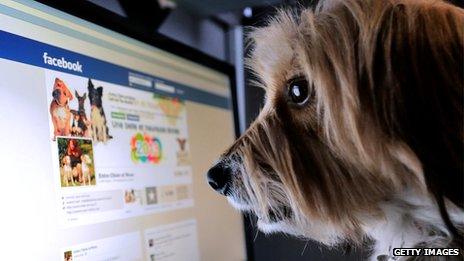Facebook’s tabloid new look
- Published
- comments

There are two things that are easy to predict about Facebook's revamped newsfeed. In the coming days millions will say they hate it - until the next time it is changed, when the same people will say they loved the previous version.
Over the years, Facebook and its founder Mark Zuckerberg have been supremely confident that they know what users want long before they know it themselves - whether it is introducing photos or bringing in the original newsfeed. Mostly they have been right.
A couple of years ago I interviewed Chris Cox, the man who masterminded many of those innovations, for a radio series on social networking. He told me the introduction of the newsfeed in 2006 had sparked the single worst reaction to any change. " I remember my entire inbox being full," he told me. "Personal messages to me from friends and family. Can you please turn this thing off, we all hate it."
But newsfeed quickly became the engine room of Facebook, shaping its future, so the biggest revision so far to the feature is an important moment for the business, its users and its customers.
By customers, I mean the advertisers who pay to keep the social network going, not the one billion people around the world who use it for free. And the big question about this bold reshaping of the look and feel of Facebook is whether it will satisfy both audiences.
The users may be less shocked than by previous changes because many will be familiar already with the new look if they've used Facebook on mobile phones or tablets. The sidebar giving easy access to individual friends, apps, groups and other features is the way you navigate on the mobile version - and it now moves to the desktop.

New-look Facebook is similar to Facebook on mobile phones
The other striking change is that every story now looks bigger and bolder, with photos getting far more prominence. That means that on any one page you will see fewer stories on your screen at any one time, making Facebook seem more like a tabloid newspaper, rather than the more broadsheet look of the past.
And prominent among the stories leaping out of the pages will be adverts. That may risk alienating users who feel queasy about having their social lives interrupted by commercial messages - but then again, will they notice?
Because Facebook advertising is evolving in such a way that many users may find it hard to distinguish it from stories shared by their friends - and indeed that is often what they are. When your friend "likes" Wiggins Widgets' new TV advert, that is likely to pop up in your newsfeed.
Rather than spend their money on standard display ads in a separate and ignorable column on the right, companies are paying to get their content right into the middle of the Facebook experience. That trend will accelerate after this redesign because newsfeed real estate will become even more valuable.
Facebook is selling the new version of newsfeed under the catchline "Goodbye clutter", insisting that it is about making the user experience better rather than boosting its advertising revenue. But if it works for users, it will make the social network more valuable for advertisers too.
A year ago, in the run-up to its stock market debut, there were concerns that Facebook would not be able to make money as it moved to mobile platforms. Now, from a standing start, mobile advertising revenues are about a quarter of the business's overall income, and the lessons learned on phones and tablets are being transferred to the desktop.
Despite a difficult year which has seen many question its long-term prospects, Facebook remains a supremely self-confident company. As Cook told me, the company learned to stay calm when changes were met with initial fury. "We knew that in the history of innovation, it's never received well. You just need to have your own vision, and you need to be willing to stick to it in the face of criticism."
Of course, sometimes Facebook is forced to retreat - as with the Beacon advertising platform which users saw as a massive attack on their privacy.
But however many groups are formed to protest against the new newsfeed, however many users say they now plan to leave because of it, Facebook is almost certain to stand firm. After studying vast amounts of data on how users and advertisers behave on the network, it is convinced that its new look will prove profitable for both.